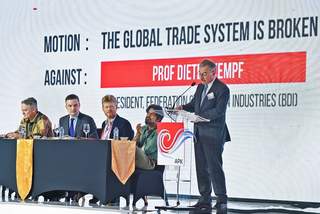
© BDI
Asia-Pacific Conference of German Business: Trade in Uncertain Times
The Asia-Pacific region is an important growth market for the German economy. But populism and protectionism are increasingly calling the liberal consensus of the past decades into question. Multilateralism is being questioned in favor of national interests. Trade conflicts are fueled. All this happens at a time when digitization and Industry 4.0 are changing the economies around the globe and ensuring the security of data flows.
For this reason, the APK, which takes place every two years, was rarely as important as it was this year. While the criticism of free trade on the part of civil society was one of the priorities at the 15th APK in Hong Kong, politics and business had to deal with the political consequences of this criticism this year. Around 900 decision-makers from Germany and Asia-Pacific met in the 16th edition of the APK in Jakarta, Indonesia, to discuss current economic and political developments.
“German business and its partners in both the Asia-Pacific region as well as in the European Union are encouraging open markets and a high level of transparency in trade, investments and in public procurement", said Hubert Lienhard, chairman of the Asia-Pacific Committee of German Business (APA), at the opening ceremony of the conference. “To this end, we promote the dialogue between business, politics, civil society and science. The APA wants to help the community of states return to a consensus on an open world trade system. This benefits companies, employees and consumers alike.”
Global Trade Regulation: The future lies in free trade
To take account of the current challenges, an Oxford-style debate took place for the first time, in which the current global trading order was controversial. BDI President Dieter Kempf stood up for the benefits of free trade on the stage. “Our collective response to the global challenges can only be a common commitment to open, free and fair global trade,” emphasized Federal Minister of Economics Peter Altmaier.
High priority on Infrastructure development in Asia
Important topics of the future were discussed within the framework of new panels on artificial intelligence and consumer behavior in Asia and complemented established APK formats on topics such as Industry 4.0 and Political Stability and Security in the Region. Likewise, the much respected Asian infrastructure initiatives were on the agenda. „The bundling of our forces is also required with regard to the expansion of infrastructure in Asia. Our long-standing European strategy of connecting Eastern Europe and Central Asia with our networks - 'Eurasian connectivity' - must be complemented with participation in Asian infrastructure initiatives, which should be financially and environmentally sustainable for the project countries,“ emphasized Hubert Lienhard.



